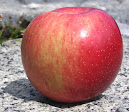Today we borrow a word from the Very Serious World of wine and ask, is it a useful way to think about apples?

|
| Nutty, with a hint of oak? (Orleans Reinette) |
Americans think of wine in terms of the grape: Cabernet, Shiraz,
Gewurztraminer. In France the vines are important but wine is classified by
the region and domain—by territory. Burgundy reds, all from the Pinot Noir
grape, can be startlingly different from one another.
Some of this difference is due to aging and blending after the harvest, but most of it is terroir. The grapes are the medium for the terroir's expression rather than the sole source of all of the wine's qualities.
The land
But what of the humble pomacious fruit?
There is no doubt that some apples do better in some climates, or express different qualities depending on where they are grown. Kevin Hauser of Apples and Oranges is devoted to growing apples in warm climates "where you're not supposed to." Many of his favorites do not do so well in New England.
But this is a much grosser effect than terroir. In France two small plots of vines, side by side and growing the same variety of grape, can produce wildly different wines.
It's not hard to notice differences in apples from different farms. I mean, the same apple varieties (and remember, these are all from grafts, ultimately, of the same original tree).
But it is impossible to know how much of this might be due to, say, a decision to harvest early at one orchard, or differences in how the apples were handled and stored before they reached the market, as opposed to terroir.
If apples were wine grapes, there would be a whole industry of fine-tuned excellence, complete with apple snobs buzzing about the exact best way to grow, harvest, and store each variety. And also with economic incentives to reward farmers for meeting those requirements.
Then, maybe, it might be possible to say that the terroir of the Nashoba Valley produces Golden Russets with particular recognizable qualities. But I think that today it is probably too fine-grained a concept to be useful to us apple munchers.

I think this could happen in the apple world if hard cider (and perry for that matter) became widely popular again in our time.
ReplyDeleteMatt, so you think it would be easier to find terroir in fermented cider than in the fruit itself?
ReplyDeleteOr do you just mean that it would take a developed cider culture to care about terroir?
Hi Adam,
ReplyDeleteThe latter.
Merry Christmas to all and thanks again for a great site here Adam. Do you have any apple-resolutions for the new year?
Many happy returns of the season to you and yours, Matt, and thank you.
ReplyDeleteNo resolutions. This blog has exceeded expectations every year mostly by not having any. A good harvest and I'm happy!